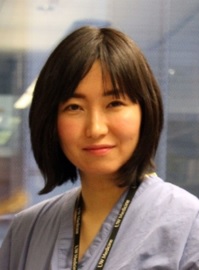Home > Organization > Divisions and Independent Research Units > Division of Rare Cancer > member > Yuki Yoshimatsu
Yuki Yoshimatsu

| Name | Yuki Yoshimatsu |
|---|---|
| Extension number | +81-3-3542-2511 ext.3463, PHS 5068 |
| Fax Number | +81-3-3542-5298 |
| yyoshima(at)ncc.go.jp ★(at) to be replaced to @ |
| Specialty | Viral carcinogenesis, exosome/miRNA, rare cancer research, patient-derived cancer model |
|---|---|
| Academic degree | Department of Pathology, Graduate School of Medicine, University of Tokyo, PhD |
| Membership | Japanese Association of Cancer Research, Japanese Society of Electrophoresis, Japan Human Cell Society |
| Comment for research | I started my scientific career with a study of viral oncogenesis, especially cervical cancers with human papilloma virus, in the National Cancer Center. My doctoral dissertation topics in Tokyo University was the analysis of molecular mechanisms of multi-step carcinogenesis in cervical cancers. In Washington University, my research interest was extended to the study of ultrastructure of auditory nerve system, particularly cochlea, and congenital hearing disorder. In 2016, I returned to the National Cancer Center, and started a research about rare cancers. |
| Current research subject | My major research interests are focusing on the expanded indications of anticancer drugs for rare cancers. A lack of adequate cancer models hinders the research and development of novel therapy in rare cancers, Thus, with a strong background of cell biology, I have been establishing patient-derived cancer models, and applying them to the in vitro high throughput drug screening. I am challenging novel tissue culture mediums, which enable high success rate of cell line establishment, based on the molecular backgrounds of diseases. Presently, I contributed to the establishment of more than 100 models of rare cancers, and identified intriguing anticancer drugs. I believe that my research will change the future of rare cancer research, and benefit patients with rare cancers. |
| From sarcoma cell line to all rare cancers | Sarcomas are rare mesenchymal malignancies, composing of more than 50 histological subtypes. Patient-derived cancer models such as cell lines, organoids, and xenografts, are critical tools for both basic research and drug development. However, the models are available for few sarcomas. Sarcomas without available models are difficult to study, and indeed, the research has not been performed for such sarcomas. To address this issue, I am establishing novel sarcoma cell lines using surgically resected tumor tissues. I established novel tissue culture mediums, which enabled high throughput drug screening. The success of establishment of cell lines relies on tissue culture medium. Each histological subtype has its own distinct genotype and phenotype backgrounds, and the tissue culture medium and substrates should be optimized to support the in vitro proliferation of sarcoma cells. Presently, we have established more than 60 cell lines and corresponding organoids, and 40 xenografts of sarcomas. Their characters and potential utilities were published in the papers. We aim to establish cell lines for all histological subtypes of sarcomas. Although it is technically feasible, as sarcomas are rare, it is hard to obtain enough tumor tissues from single institutes. Thus, multi-institutional collaboration is critical for our aim. We have joined to the project of Japanese Sarcoma Genome Consortium, and collaborate with the member of consortium for model establishment. Cell lines have diverse utilities, and they should be shared with many researchers and in multiple projects. We deliver our cell lines to the researchers upon requests. Our cell lines have been used in several dozens of laboratories, generating intriguing results. Currently, we are focusing on sarcomas. However, a lack of patient-derived cancer models is a general issue in rare cancers. We hope that the story of our sarcoma project becomes a best practice of rare cancer research, and patient-derived cancer models are established for other rare cancers in a similar way. A paucity of adequate cancer models hinders the research and development in the rare cancers. By creating and delivering novel cancer models, we can change this situation. We believe that our research activity will change the future of research and clinical practice of sarcomas and all other rare cancers. Overall picture and concept of our model project is summarized in the following image. |
| Presentation | PATIENT-DERIVED SARCOMA MODELS TOWARDS NOVEL BIOLOGY AND TREATMENT |
| Publication |
|

